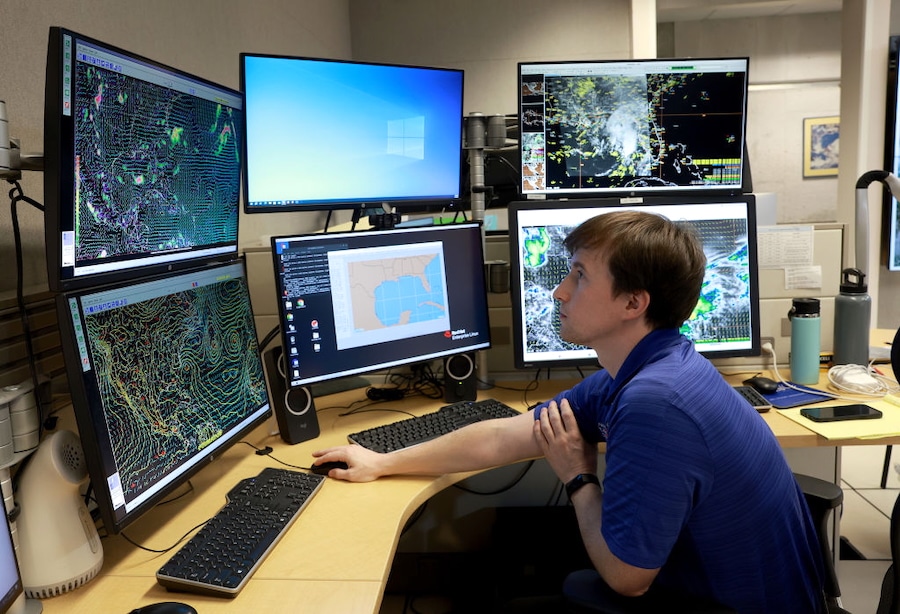This post was originally published on Eco Watch
The United States National Oceanic and Atmospheric Administration (NOAA) has placed new restrictions on scientists that those inside the agency have said could hamper the availability and quality of global weather forecasts.
Current and former high-level scientists with the federal agency said the new rules have created unease and caused alarm with partners at European agencies, reported The Guardian.
“My expectation is that it’s going to be a crackdown on climate,” said a senior NOAA scientist who wished to remain anonymous. “People are just somewhere between disturbed and terrified.”
In October, I reported on Project 2025’s plan to gut NOAA, the National Weather Service, & climate research
Today The Guardian is reporting “DOGE staffers enter NOAA headquarters and incite reports of cuts and threats”
www.nbcnewyork.com/news/nationa…— Chase Cain (@chasecain.bsky.social) February 4, 2025 at 10:51 PM
The new NOAA restrictions, as communicated in a staff-wide message last week, said agency headquarters would implement further oversight over emails and “virtual meetings” of scientists with foreign nationals.
The new rules also require that all employees and NOAA affiliates must document “all international engagements” for approval on a case-by-case basis.
“[I]t’s a crazy amount of stuff to do. Working internationally is so routine, it’s just hardly thought of,” the scientist said. “It’s a difficult time to be a federal employee right now.”
The extra administrative burden looked to be especially taxing for the National Weather Service (NWS), which provides free weather forecasting to the public.
According to a recent study, NWS produces $73 in benefits to the American people for every dollar invested, as well as additional value to the world through free access to public data.
An email sent to NOAA Research on Wednesday said the department would start having to submit all “international engagement” to be approved, including gatherings of international organizations, travel and face-to-face meetings, The Washington Post reported.
“People have asked, ‘What if I have a postdoc [researcher] and they’re not a U.S. citizen?’” a fisheries employee said. “Nobody has an answer for those types of questions.”
A climate scientist with the European Union’s Copernicus Climate Change Service, who also preferred not to be named, said last week’s news “appalled and saddened” him, reported The Guardian.
“The climate crisis knows no boundaries, and halting international scientific collaboration can only undermine our ability to understand and combat it,” the scientist said.
NOAA staff are preparing for more staffing and budgetary cuts that would put extra strain on the agency.
Current employees were told to expect budget cuts of 30 percent and for staff to be cut in half, former NOAA officials disclosed to CBS News.
“Hearing reports that Musk’s cronies are targeting NOAA — infiltrating key systems & locking out career employees,” Chris Van Hollen, Democratic senator from Maryland, posted on X Tuesday. “NOAA is vital for weather forecasting, scientific research & more. Their critical work saves lives. My team and I are looking into this & we will not stand for it.”

A NOAA field command vehicle with a tornado in sight in Wyoming on June 5, 2009. Dr. Mike Coniglio / NOAA NSSL
Congressional aides told CBS that lawmakers had gotten multiple complaints about staff from the Department of Government Efficiency (DOGE), run by Elon Musk, coming into NOAA offices.
“They walked through security like it didn’t apply to them,” said Andrew Rosenberg, former NOAA deputy director, as CBS News reported. “They were there and they were going through IT systems… They’re not asking substantial questions about what NOAA does and the importance of its role. This isn’t a review to figure out efficiency.”
Policy experts inside Trump’s “inner circle” are looking to privatize the NWS, reported The Guardian. But because it’s so valuable to society, former chief of the NWS weather prediction center’s forecast operations Greg Carbin said the new NOAA restrictions can’t be viewed as strictly cost-saving measures.
“Cutting these services now would be a reckless decision that would cost far more in lives and damages than it would ever save on a balance sheet,” Carbin said. “Investing in weather and climate services is not a cost – it is an essential safeguard for the nation’s security, economy and wellbeing.”
Earlier this month, DOGE put NOAA’s head of human resources on administrative leave. It also initiated a purge of activities associated with equity, diversity and inclusion.
NOAA sources have said that the extra administrative burden, coupled with anticipated budget and staff cuts, in addition to the federal hiring freeze, will interfere with the country’s ability to keep the public weather service functional. It could also cause a restriction of freely available NOAA data abroad, leading to “a profound global impact.”

“Accurate forecasts protect lives, mitigate billions of dollars in disaster-related damages, and enable businesses, from agriculture to transportation, to operate more efficiently,” Carbin said, as The Guardian reported.
Approximately 4,500 scientists and technicians are normally employed by the NWS, but the agency is struggling to keep a full staff.
According to a senior NOAA official, “hundreds” of NOAA staff have accepted the Trump administration’s federal buyout.
“If the proposed cuts to NOAA and NWS are enacted, the consequences will be severe,” Carbin added. “It will lead to less accurate and slower weather forecasts and warnings – putting lives and property at risk.”

The post NOAA Imposes Restrictions on Scientists, Raising Concerns Over Global Forecasting appeared first on EcoWatch.





0 Comments